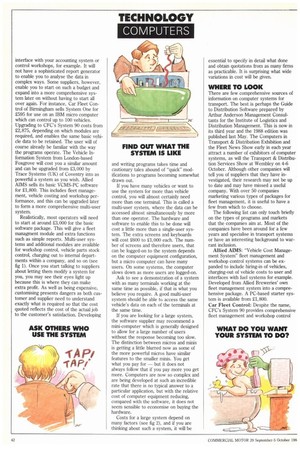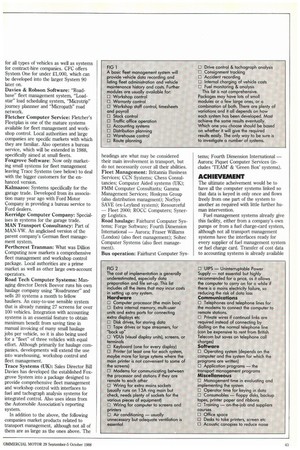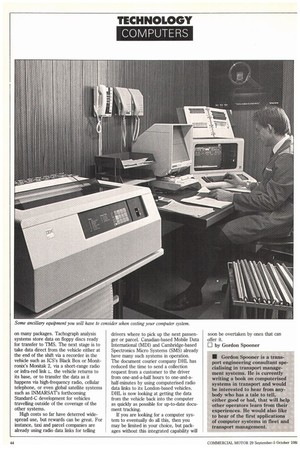There are few comprehensive sources of information on computer systems
Page 34

Page 35

Page 36

If you've noticed an error in this article please click here to report it so we can fix it.
for transport. The best is perhaps the Guide to Distribution Software prepared by Arthur Anderson Management Consultants for the Institute of Logistics and Distribution Management. This is now in its third year and the 1988 edition was published last May. The Computers in Transport & Distribution Exhibition and the Fleet News Show early in each year attract a number of exhibitors of computer systems, as will the Transport & Distribution Services Show at Wembley on 4-6 October. Although other companies will tell you of suppliers that they have investigated, their research may not be up to date and may have missed a useful company. With over 50 companies marketing various types of packages for fleet management, it is useful to have a few from which to choose.
The following list can only touch briefly on the types of programs and markets that the companies aim at. Most of the companies have been around for a few years and specialise in transport systems or have an interesting background to warrant inclusion.
Allied AIMS: "Vehicle Cost Management System" fleet management and workshop control systems can be expanded to include hiring-in of vehicles, charging-out of vehicle costs to user and interfaces with fuel systems for example. Developed from Allied Breweries' own fleet management system into a comprehensive package. A PC-based starter system is available from £1,800.
Car Fleet Control: Despite the name, CFC's System 90 provides comprehensive fleet management and workshop control for all types of vehicles as well as systems for contract-hire companies. CFC offers System One for under 21,000, which can be developed into the larger System 90 later on.
Davies & Robson Software: "Roadbase" fleet management system, "Loadstar" load scheduling system, "Microtrip" journey plannner and "Micropath" road network.
Fletcher Computer Service: Fletcher's Fleetplan is one of the mature systems available for fleet management and workshop control. Local authorities and large companies are specific markets with which they are familiar. Also operates a bureau service, which will be extended in 1988, specifically aimed at small fleets. Foxgrove Software: Now only marketing small systems for fleet management leaving Trace Systems (see below) to deal with the bigger customers for the enhanced version.
Kalmazoo: Systems specifically for the garage trade. Developed from its association many year ago with Ford Motor Company in providing a bureau service to Ford dealers.
Kerridge Computer Company: Specialises in systems for the garage trade. MAN Transport Consultancy: Part of MAN-VW. An anglicised version of the parent company's German fleet management system.
Perthcrest Tranman: What was Dillion Computing now markets a comprehensive fleet management and workshop control package. Local authorities are a prime market as well as other large own-account operators.
Road Tech Computer Systems: Managing director Derek Beevor runs his own haulage company using "Roadrunner" and sells 20 systems a month to fellow hauliers. An easy-to-use sensible system that is already running 27 screens for over 100 vehicles. Integration with accounting systems is an essential feature to obtain maximum benefit from saving time in manual invoicing of many small haulage jobs per vehicle, so it is also being used for a "fleet" of three vehicles with equal effort. Although primarily for haulage companies, developments will extend the use into warehousing, workshop control and fleet management.
Trace Systems (UK): Sales Director Bill Davies has developed the established Foxgrove System into a package designed to provide comprehensive fleet management and workshop control with interfaces to fuel and tachograph analysis systems for integrated control. Also uses ideas from the Automobile Association's reporting system.
In addition to the above, the following companies market products related to transport management, although not all of them are as large as the ones above. The headings are what may be considered their main involvement in transport, but do not necessarily cover all their abilities. Fleet Management: Britannia Business Services; CCN Systems; Chess Consultancies; Computer Aided systems (UK); FMM Computer Consultants; Gamma Management Services; Hoskyns Group (also distribution managment); NorSys SAVE (ex-Leyland system); Resourceful — Fleet 2000; ROCC Computers; Synergy Logistics.
Road haulage: Fairhurst Computer Systems; Forge Software; Fourth Dimension International — Aurora; Fraser Williams (London) (also fleet management); Soltec Computer Systems (also fleet management).
Bus operation: Fairhurst Computer Sys tems; Fourth Dimension International — Aurora; Piquet Computer Services (includes 'TEAM' & 'Green Box' systems).
ACHIEVEMENT
The ultimate acheivement would be to have all the computer systems linked so that data is keyed in only once and flows freely from one part of the system to another as required with little further human intervention.
Fuel management systems already give this facility, either from a company's own pumps or from a fuel charge-card system, although not all transport management systems have the interfaces ready for every supplier of fuel management system or fuel charge card. Transfer of cost data to accounting systems is already available on many packages. Tachograph analysis systems store data on floppy discs ready for transfer to TMS. The next stage is to take data direct from the vehicle either at the end of the shift via a recorder in the vehicle such as ICS's Black Box or Monitronix's Monitak 2, via a short-range radio or infra-red link a, the vehicle returns to its base, or to transfer the data as it happens via high-frequency radio, cellular telephone, or even global satellite systems such as INMARSAT's forthcoming Standard-C development for vehicles travelling outside of the coverage of the other systems.
High costs so far have deterred widespread use, but rewards can be great. For instance, taxi and parcel companies are already using radio data links for telling drivers where to pick up the next passenger or parcel. Canadian-based Mobile Data International (MDI) and Cambridge-based Spectronics Micro Systems (SMS) already have many such systems in operation. The document courier company DHL has reduced the time to send a collection request from a customer to the driver from one-and-a-half hours to one-and-ahalf-minutes by using computerised radio data links to its London-based vehicles. DRL is now looking at getting the data from the vehicle back into the computer as quickly as possible for up-to-date document tracking.
If you are looking for a computer system to eventually do all this, then you may be limited in your choice, but packages without this integrated capability will soon be overtaken by ones that can offer it.
0 by Gordon Spooner
















































